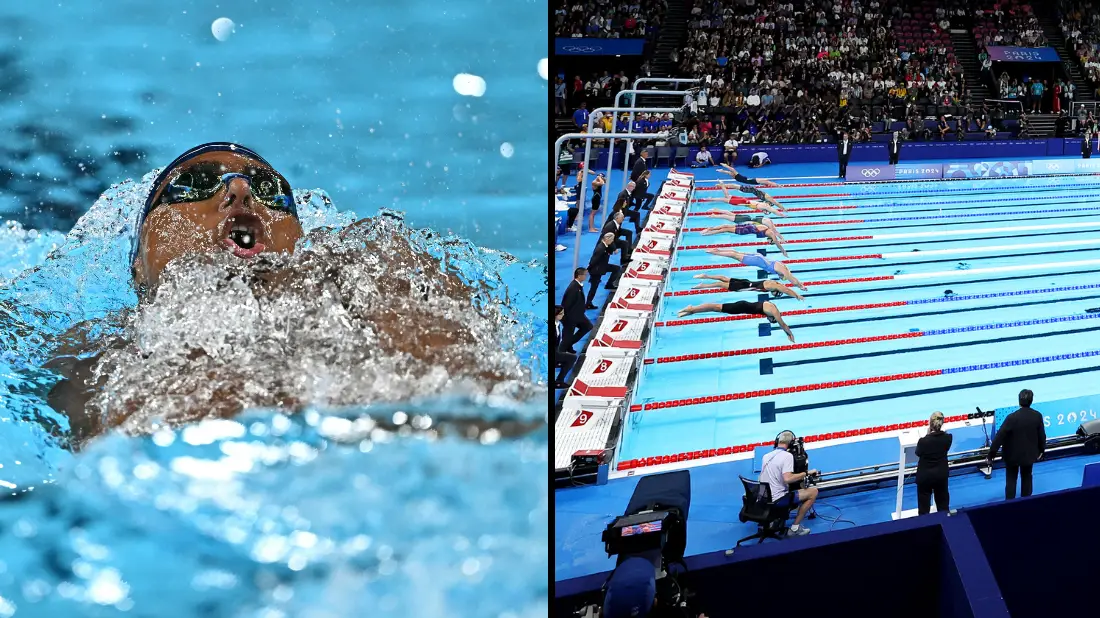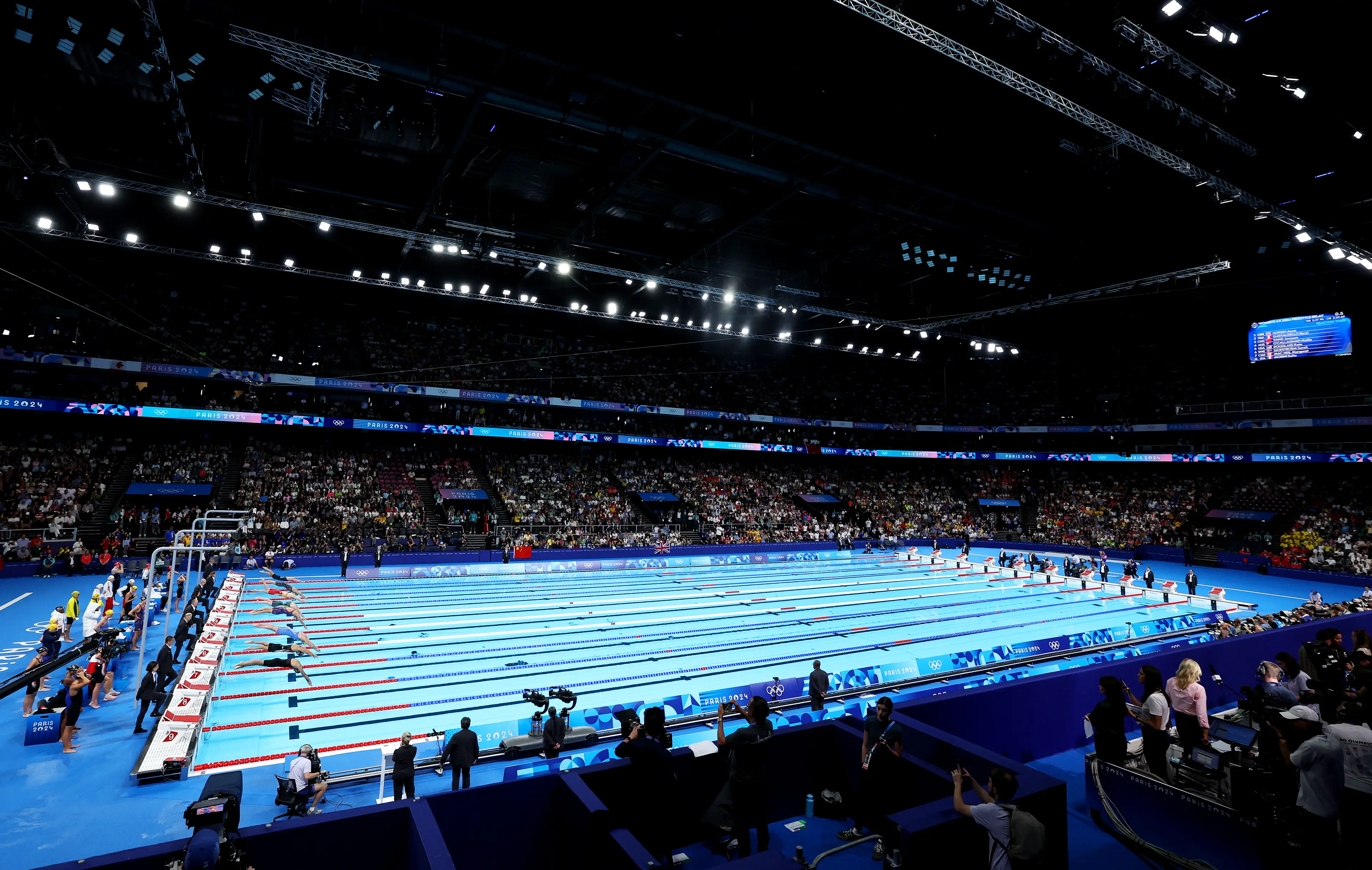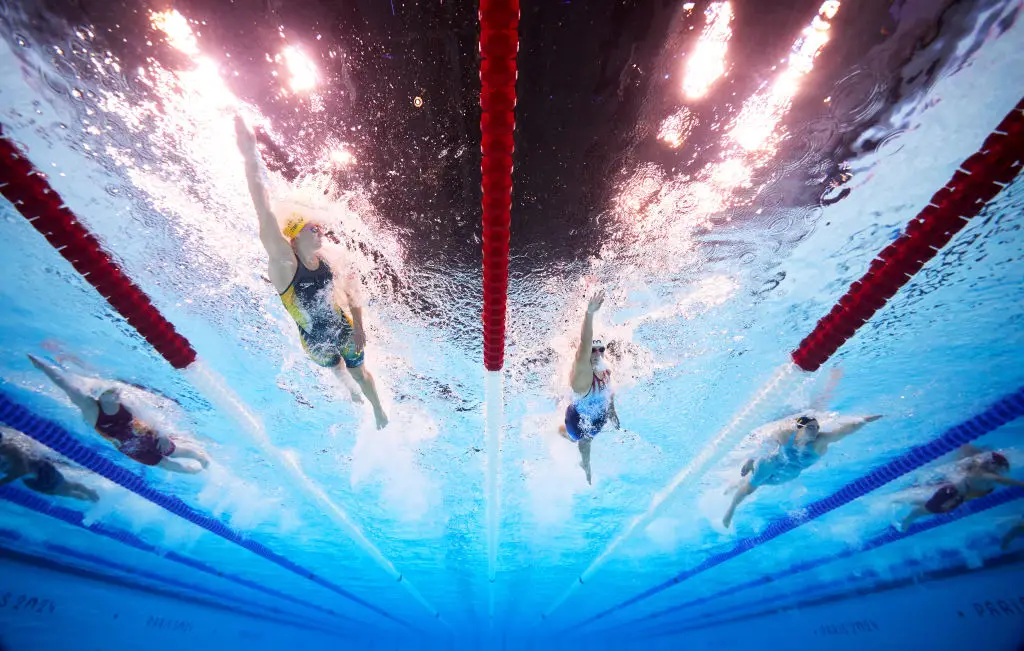
The 2024 Paris Olympics has been hit by a conspiracy theory that some believe is a payback to events that happened at the Games 16 years ago.
As it stands, not a single swimming record has been broken at the Paris Games. In fact, the athletes haven't really come close at all.
And fans of the discipline reckon it's down to the 'slow swimming pool' being used by athletes; with some even suggesting it has been done on purpose by organisers.
What is a 'slow swimming pool'?
It's all to do with the depth of the pool being used.
Advert
Traditionally, most international competitions use pools that are three metres in depth.
But for the 2024 Paris Olympics, the pool at the Paris La Défense Arena is 2.15 metres deep; that's short of the minimum of 2.5 metres that World Aquatics recommends for an Olympic competition.
As a result of the difference in depth, an issue called 'slow' swimming is created which is where the water is more volatile when dispersed than in a deeper pool.
As a result you get more wavy and choppy waters, with the lack of depth meaning the strokes by the swimmers hit the bottom of the pool with more force before bouncing back.

How does it impact an athlete?
The choppier the water, the more resistance faced by the swimmer.
This is mostly an issue in the second 50 metres of a 100-metre swim, and so on, due to the water being dispersed by the first length of the pool being swam in.
John Ireland, the U.S. director of technical services at Myrtha Pools, said earlier this year that the difference between a three and 2.5 metre pool is 'nothing'.
But heads are being scratched over the issue when the likes of US sensation Gretchen Walsh can't even match her personal best time. Team GB's Adam Peaty clocked in at more than 59 seconds when winning silver in the men's 100m breaststroke; well short of his world record of 56.88 seconds and even his gold medal time of 57.37 seconds at the 2020 Tokyo Games.
Ken Ono, a data specialist who works with U.S. swimmers, told Yahoo Sports: "The pool is fast compared to your neighbourhood swim club. However, it is not ideal for record setting. The shallow depth is a primary reason. I have heard from a few competitors that they have been forced to (slightly) modify their dives off the blocks."

Conspiracy and the internet being the internet
Olympics viewers have become fully invested in the 'slow swimming pool' issue, conspiring over whether it's for a more sinister reason.
And with the internet being the internet, it's gone in to full overdrive mode, suggesting it is 'inside job' for the Men's 4 × 100 metre freestyle relay at the 2008 Beijing Games; commonly referred to as the greatest swimming event of all time.
It saw Team USA, led by Michael Phelps, win gold with a new world record. France, who were extremely confident of beating the Yanks, came second - just 0.08 seconds behind them. They sat a new European record in doing so.
The bronze medal went to Australia, who also set a new Oceanic record.
All eight finalists swam faster than the gold medal time in the 2004 Athens Games.
One conspirator posted: "What if President Macron and [2008 French swimmer] Alain Bernard are still so p*ssed about the 2008 relay that they built a two metre pool instead of a three metre because they know American swimmers rely more heavily on underwaters due to short-course yards. I think it's an inside job to a level the playing field by taking away the US Team's biggest advantage."
It's fun to conspire, but maybe stop thinking it could be as serious as that. The general consensus is that records might not be beaten but everyone is still swimming in the same pool, so the playing field is as even as it always is.
Team GB's current medal count - 12
Gold medallists
- Rosalind Canter, Laura Collett, Tom McEwen: Equestrian - Eventing team
- Tom Pidcock: Mountain Bike - Men's cross country
- Nathan Hales: Shooting - Men's trap
- Tom Dean, Kieran Bird, James Guy, Jack McMillan, Matthew Richards, Duncan Scott: Swimming - Men's 4x200m freestyle
Silver medallists
- Anna Henderson: Cycling - Women's individual time trial
- Adam Peaty: Swimming - Men's 100m breaststroke
- Tom Daley and Noah Williams: Diving - Men's synchronised 10m platform
- Adam Burgess: Canoe Slalom - Men's canoe single
- Matthew Richards: Swimming - Men's 200m freestyle
Bronze medallists
- Yasmin Harper and Scarlett Mew Jensen: Diving - Women's synchronised 3m springboard
- Kimberley Woods: Canoe - Women's slalom
- Laura Collett: Equestrian - Eventing individual
Topics: Olympics, Sport, Conspiracy Theory, World News, Europe